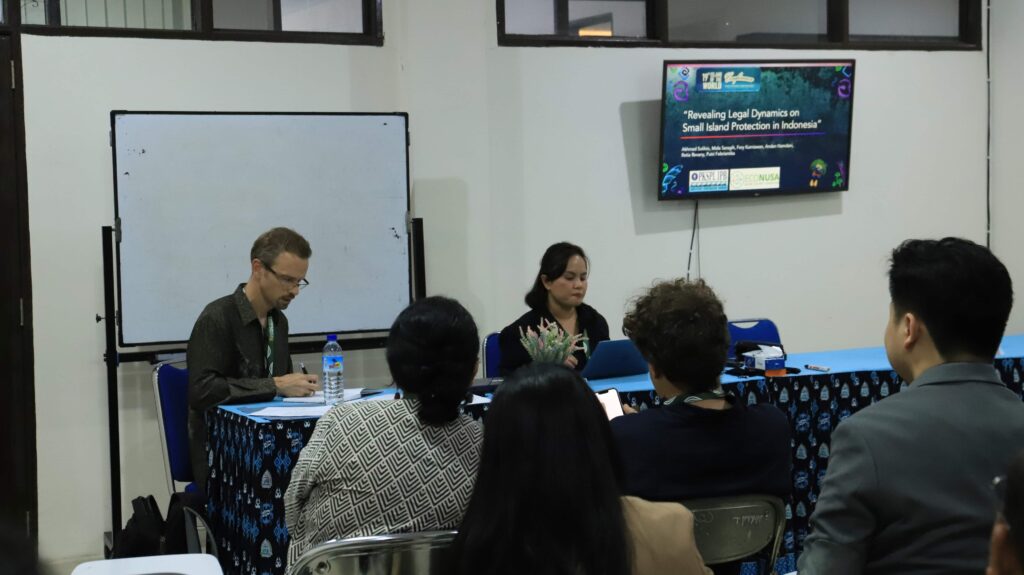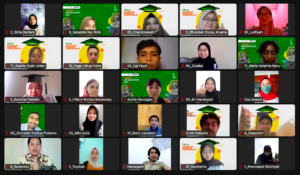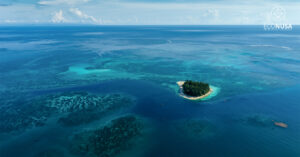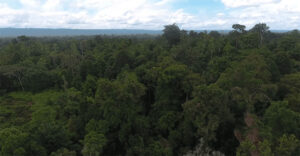
The 19th International Small Islands Studies Association (ISISA) Conference/Islands of the World Conference took place at the University of Mataram, Lombok, West Nusa Tenggara, from June 25-29, 2024. This event marked the first global island conference held in Southeast Asia, providing a platform for communities, ideas, cultures, and research traditions conducted by practitioners and academics related to all aspects of island life.
The focus of the 19th ISISA Conference aligns with the research collaboration between the EcoNusa Foundation and the Center for Coastal and Marine Resources Studies (PKSPL) of the Bogor Agricultural Institute. This research focuses on small island governance, titled “Protecting Small Islands from Development Pressures and Climate Crisis.” In one of the thematic discussion sessions, EcoNusa, along with PKSPL IPB, presented the results of this study, while also gaining knowledge from experts, organizations, communities, and researchers.
In this discussion session, EcoNusa and PKSPL IPB highlighted the importance of islands. Small islands possess significant natural resources, both biotic and abiotic. These natural resources are a source of livelihood for coastal communities, both those living on and off these small islands. However, these islands face threats, such as global warming, which leads to rising sea levels that could potentially submerge the islands in the long term, and by development that can damage the natural resource ecosystems. Therefore, the exploitation of the potential resources of small islands not only harms the environment, but also impacts the sustainability of local communities.
Read Also: Joint Effort to Preserve the Sea and Coastal Area in Jor Bay, NTB
In addition to EcoNusa and PKSPL IPB, the conference also featured more than 120 speakers from 25 countries. They discussed a wide range of topics, including climate and environmental change, island governance, blue economy, island culture, island networks and digital ecosystems, as well as islands and the development of nations in small islands. This gathering provided an opportunity for various parties to listen to and engage in discussions with those “working on the ground.” ISISA offers ample space for action-oriented research while also serving as an academic research forum.
The International Small Islands Studies Association (ISISA) was established to advance the study of islands, encouraging curiosity, and fostering debate about islands. Through this, ISISA brings together people from all walks of life interested in coastal, island, and ocean issues. ISISA was officially established in 1992, coinciding with the Islands of the World III Conference, which took place in Nassau, Bahamas. The first official ISISA meeting was held in Okinawa, Japan, in 1994. This meeting was sponsored by INSULA (UNESCO’s International Scientific Council for Island Development), the International University of Japan, the Okinawa Labour and Economic Research Institute, and the Office of the Governor of Okinawa Prefecture.
Read Also: Marine Station EcoNusa: Promoting Marine Conservation and Sustainable Development in Banda Neira
This year, Indonesia hosted the 19th ISISA Conference. The Center for Coastal and Marine Resources Studies (PKSPL) – International Research Institute for Maritime, Marine, and Fisheries (LRI i-MAR) at IPB University organized the world conference with the theme “Islands and Resilience: Global Opportunities.” This conference highlighted the importance of international cooperation and networking in addressing the impacts of climate change on islands, promoting the protection of island cultures, and preserving biodiversity. Islands are not just land surrounded by the sea; they are spaces for social interaction between humans and nature.
The supporters of this international meeting hope that the 19th ISISA Conference can contribute to the UN Decade of Ocean Science for Sustainable Development (2021-2030), which supports marine science and knowledge to restore the declining condition of ocean systems and catalyze new opportunities for the sustainable development of the world’s marine ecosystems.
Islands around the world are facing economic, social, cultural, and environmental changes. To tackle the challenges posed by of climate change and development, global efforts are needed to ensure the sustainability of islands, including developing innovative recommendations based on scientific studies.




